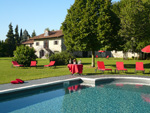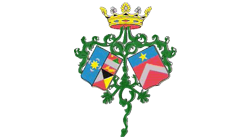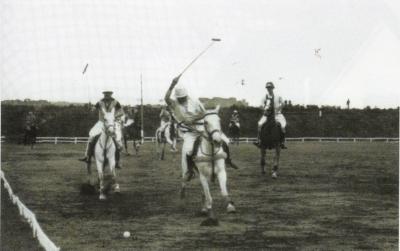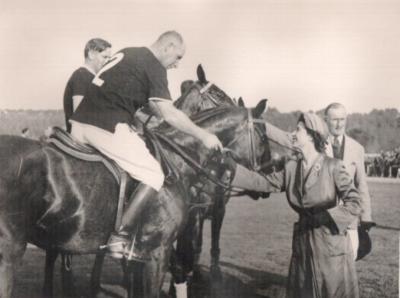|
By Giuseppe Guarino
In celebration of a hundred years of his birth, I feel I should remember a person who I was lucky enough to know: Marquis Rodolfo de Carvalho de Moraes, or to his friends: Stelio. “When will you decide to speak to me informally, I’m young you know!”, he always repeated that phrase to me, when we met at horse events or in the streets of Udine or at the home of mutual friends, and as he was saying it he would place his hands on his hips, and bend his knees just to show how young he was – and he really was – if not in body he certainly was in spirit. I always skated over this request and answered with the obsequious smile of a half-wit. I couldn’t take such liberties, with someone who for me was a myth. Just the fact of being close to him was for me something to be proud of. 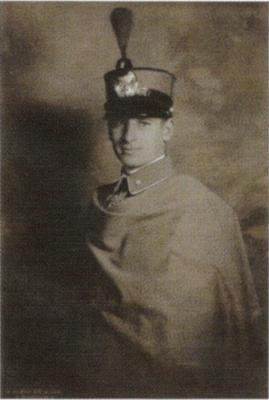 He was born in Corio Canavese (TO) on May 1st 1905, into a family of ancient traditions: his mother was Piedmontese and his father Portuguese. He studied English for eight interminable years, whilst attending and graduating from a French high school. He was born in Corio Canavese (TO) on May 1st 1905, into a family of ancient traditions: his mother was Piedmontese and his father Portuguese. He studied English for eight interminable years, whilst attending and graduating from a French high school.
He began his military career on September 6th 1926 as a reserve officer cadet before serving in the “Alexandria Light Cavalrymen” regiment. On September 30th of the same year he renounced his rank in order to enter the Cavalry and Infantry Academy in Modena. He was promoted to second lieutenant in the Cavalry and was assigned to the “Vittorio Emanuele II” Regiment where he had already served as a reserve officer cadet sergeant – on December 12th 1932 he was transferred to the “Piemonte Reale” Regiment . On October 1st 1933, the regiment was transferred to Rome from Udine. Whilst in Rome, he met Countess Agnese de Puppi whom he married on May 22nd 1935. Gianguido and Marisanta (who married Count Pietro Enrico di Prampero) were born in Turin followed by Carlo who was born in Friuli. Coming back to his military pilgrimage, we see him returning to Pinerolo and to the Cavalry’s School of Application. During his time there, he took part in the national military polo team, a sport which would crown his career. His successes in the team began, in fact during the fortunate October of 1935 with the “Pinerolo” Cup, continuing with the “Lyadia di Furnari” Cup, the “de Carvalho” Cup and the FISE Cup played in Merano. The successes of the team – of which he had become captain - continued until 1938 when the number of games played were almost the same as those won: amongst the more famous of these was the famous “Mrs Frank Jay Gould” Cup played in Brioni, when the Italian team overturned the result with three points scored by their captain. In 1939 he was transferred to the “Light Cavalry of Saluzzo”. In May 1940 he just had time to play the “Capanelle” Cup in Rome and the Italian Championship (as the country was declared in a state of war in May 1941 and sporting activities were stopped). On July 28th 1942 he followed the Mobile Military Centre of the Grenadier guards of Sardinia” and in September of the same year he was promoted to Major then on June 27th 1943 he was transferred to the “Savoia Cavalry”; a fortnight later he left for action with the regiment. Later on September 8th 1943, he escaped capture and once again came before the Military recruiting office in Udine, and then before the Allied Military Government, the Territorial Military Command in Rome, the Central Military Command School and then again before Udine’s Military Recruiting office in Udine. These movements constituted his continuous pilgrimage until January 1st 1949 when he came to the “Genoa Cavalry”. Notwithstanding these difficult years, he reorganised the team’s sporting activities playing the ENIT cup in April 1947 in Rome. From 1950 to 1961 he was assigned to the Defence Ministry’s Horse inspectorate and then to the pre-Olympic military horse Centre: his matches and international successes are too many to count. Amongst the most important are two international cups in Cairo; the Championat de Loriane in Vittel; the “Montellana”, “Lamiaco” and “Federazione Spagnola Polo” cups in Madrid; the “Coppa dei Vosgi” in France, and again in Spain with the “Capitan Generale Catalogna” cup; as well as all the international matches played in Rome, Bologna, Merano, Pinerolo, and Turin. What else is there to say about this great polo player who led the Italian team to all its international successes. 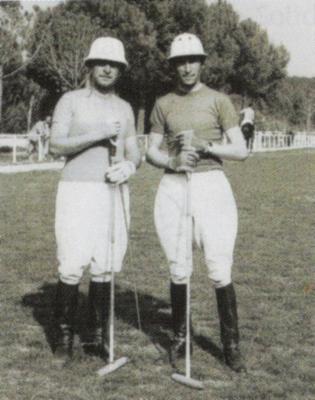 In 1984, I was lucky enough to see him ride during a polo match, no longer as captain, but as a referee in a match played in Pordenone on the “Cumina” pitch. In 1984, I was lucky enough to see him ride during a polo match, no longer as captain, but as a referee in a match played in Pordenone on the “Cumina” pitch. He was almost eighty, but I saw him galloping from one side of the pitch to the other, like a twenty-year-old for the entire forty-two minutes of the match. One day at the end of June 1996, marquis General Rodolfo de Carvalho de Moraes, aged 91 passed away, leaving an emptiness as all such gentlemen of his era did; an emptiness which cannot ever be filled because these men take a world, an era and way of life away with them. I would like to remember him sitting amongst the panel of judges at a horse event. . It was an unusually rainy day during the month of July at Spessa castle in Capriva, when, during the reconnaissance of the course, he came towards me, holding an umbrella closed at the point which he turned upside down, lightly touching the lawn with the handle miming a forward stroke with a ball to the right then staring me right in the eyes he said “I used to be good you know” I seldom missed the ball” – “I know that you were good, and I am sure that you still would be” I replied, and smiling he took my arm and told me of the time at the Acqua Acetosa when the opposing team led by the Englishman, Freeborn, were in a clear lead but how he was able to turn the game around and during the final minutes of the match, thanks to two of his goals – as well as those of Lieutenants Pirzio Biroli and de Landerset – his team won yet another impossible victory. You are no longer here to tell me of the exploits of your life which so fascinated me; you are no longer here to judge the courses, to assess the riders, to wink at me discreetly when a pretty lady rider passes by. Taking a verse from Garcia Lorca I would like to say this to you “It will be a long time, if ever, before there is born…” an officer and gentlemen like you. I imagine that under your white and perfectly cut moustache, you will be smiling because at last I am able to speak to you informally. Cavalry Magazine May 2005
|
